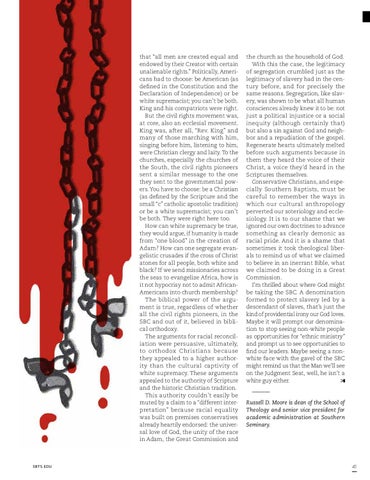that “all men are created equal and endowed by their Creator with certain unalienable rights.” Politically, Americans had to choose: be American (as defined in the Constitution and the Declaration of Independence) or be white supremacist; you can’t be both. King and his compatriots were right. But the civil rights movement was, at core, also an ecclesial movement. King was, after all, “Rev. King” and many of those marching with him, singing before him, listening to him, were Christian clergy and laity. To the churches, especially the churches of the South, the civil rights pioneers sent a similar message to the one they sent to the governmental powers. You have to choose: be a Christian (as defined by the Scripture and the small “c” catholic apostolic tradition) or be a white supremacist; you can’t be both. They were right here too. How can white supremacy be true, they would argue, if humanity is made from “one blood” in the creation of Adam? How can one segregate evangelistic crusades if the cross of Christ atones for all people, both white and black? If we send missionaries across the seas to evangelize Africa, how is it not hypocrisy not to admit AfricanAmericans into church membership? The biblical power of the argument is true, regardless of whether all the civil rights pioneers, in the SBC and out of it, believed in biblical orthodoxy. The arguments for racial reconciliation were persuasive, ultimately, to orthodox Christians because they appealed to a higher authority than the cultural captivity of white supremacy. These arguments appealed to the authority of Scripture and the historic Christian tradition. This authority couldn’t easily be muted by a claim to a “different interpretation” because racial equality was built on premises conservatives already heartily endorsed: the universal love of God, the unity of the race in Adam, the Great Commission and
sbts.edu
the church as the household of God. With this the case, the legitimacy of segregation crumbled just as the legitimacy of slavery had in the century before, and for precisely the same reasons. Segregation, like slavery, was shown to be what all human consciences already knew it to be: not just a political injustice or a social inequity (although certainly that) but also a sin against God and neighbor and a repudiation of the gospel. Regenerate hearts ultimately melted before such arguments because in them they heard the voice of their Christ, a voice they’d heard in the Scriptures themselves. Conservative Christians, and especially Southern Baptists, must be careful to remember the ways in which our cultural anthropology perverted our soteriology and ecclesiology. It is to our shame that we ignored our own doctrines to advance something as clearly demonic as racial pride. And it is a shame that sometimes it took theological liberals to remind us of what we claimed to believe in an inerrant Bible, what we claimed to be doing in a Great Commission. I’m thrilled about where God might be taking the SBC. A denomination formed to protect slavery led by a descendant of slaves, that’s just the kind of providential irony our God loves. Maybe it will prompt our denomination to stop seeing non-white people as opportunities for “ethnic ministry” and prompt us to see opportunities to find our leaders. Maybe seeing a nonwhite face with the gavel of the SBC might remind us that the Man we’ll see on the Judgment Seat, well, he isn’t a white guy either. ________ Russell D. Moore is dean of the School of Theology and senior vice president for academic administration at Southern Seminary.
41
